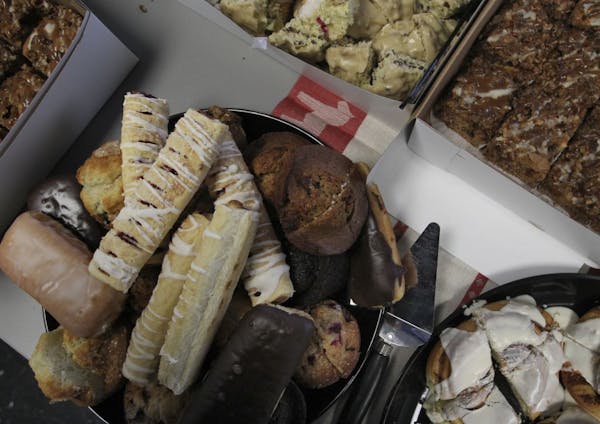When the last employee arrived at the break room, Ross Plaetzer roped it off with blue and yellow crepe paper and said everyone needed to remain in what he called the Fika Interaction Area for at least 15 minutes. No grabbing a doughnut and scurrying back to work. The scene was, as some tell it, a little awkward.
Seeing one group of buddies gravitate to the conference room, Plaetzer made a mental note. At the next month's fika, the chairs had been wheeled away, "because people will go to their 'safe spot' if you let them." Awkward.
Yet one year later, the number-crunchers at Employer Solutions Group in Edina look forward to their monthly fika not only with hearty appetites, but anticipation.
Fika (say FEE-ka) is a Swedish concept that most of us would call a coffee break. But that connotes taking an individual break "from" work, while fika is more about taking a social break "toward" your colleagues. Plaetzer, director of client services at ESG, heard of it on Swedish radio, and thought it could be one solution to the challenge of building community among his employees as the business grew ever more strung out in a series of office suites.
"We put in some long days," he said, with 48 employees handling payroll, workers' compensation, employee benefits and such for other companies. Most of them are corralled in shoulder-high cubicles, ears to phones, fingers to keyboards. So when one employee quoted the cult movie "Office Space" -- Ahhh, I'm also gonna need you to go ahead and come in on Sunday, too. -- it was funny because it speaks to how a job can consume your life.
"In a lot of ways, you spend more time with these people than with your own family," said Jeff Hollander, hired three months ago and attending his third fika, which on this morning was a spread of scrambled eggs, sausages, yogurt, fruit and pastries -- and the obligatory candy dish of gummy Swedish fish.
Encouraging engagement
The ritual throws some first-timers for a loop.
"I wondered, what the heck is a fika?" said Jake Casebolt, an account assistant. "I had to Google it to find out." But, he said, "it's a good way to meet people you'd otherwise see only in passing."
Doyle, a payroll supervisor who just goes by Doyle (really), said fika "really forces you to interact with people, other than the usual, 'How's life?' With birthday cakes, people still just grab a piece and go back to their desks, but you really find yourself engaging with people at fika."
"Engagement" happens to be a buzzword in management circles today, said Barb Krantz Taylor, a co-principal and executive coach with the Bailey Group, an executive coaching firm in Minneapolis. Finding ways for employees to feel engaged in their jobs makes a happier workplace, she said, but also helps the bottom line.
"Customer engagement goes up," Taylor said, reeling off a series of statistics: There's 40 percent less turnover among high performers, 26 percent higher revenues per employee, 38 percent higher customer satisfaction, 20 percent fewer missed workdays -- you get the picture.
While Taylor didn't say Plaetzer's monthly fika would relate directly to the bottom line, the gatherings do serve the squishier goal of helping co-workers get to know one another and, ideally, present themselves as likable.
I like you
This is no small thing.
"When you think of all the things that cause you to not only comply with the organization, but compel you to put in the extra hours, it's knowing that you are working with likable people," she said. "If you're liking your job, you're easier to work with. People don't avoid working with you."
"This is the Upper Midwest; people don't like to engage with cranky people," she said. "So let's say there's a cranky co-worker with information I need. Likely I will avoid them longer than I should."
As for fika as a management concept, Taylor would soft-pedal the mandatory attendance factor, but gives Plaetzer credit for taking steps. "And food always brings people together. It's better than bowling or zip-lining."
To be clear, the "mandatory" label isn't meant to be coercive but encouraging, said Lyncee Davies, a benefits administrator who coordinates each fika. "We call it mandatory," she said. "But it's really just a way to give people permission to get up from their desks."
A recent fika began with an icebreaker game in which each person had the name of a famous person taped to his or her back, then had to ask questions of others to figure out who it was. The winner got dibs at the buffet, and could wear jeans for a week.
Kristin Zust, who actually lived in Sweden for a bit, read the menu in fairly fluent Swedish, ending with, Ät, drick och var glad, or "Eat, drink and be merry."
It wasn't awkward at all.
Kim Ode • 612-673-7185
New attorney joins prosecution team against Alec Baldwin in fatal 'Rust' shooting
Judge in Trump case orders media not to report where potential jurors work
Booming cold drink sales mean more plastic waste. So Starbucks redesigned its cups

Allman Brothers Band co-founder and legendary guitarist Dickey Betts dies at 80

